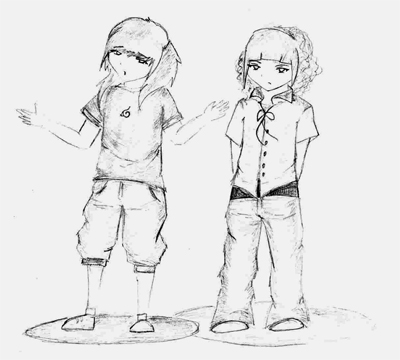My neighbor Tanya is one year older than I am, but we have
been friends since childhood. She has always been kind and
cheerful, she could stand up for herself. Moreover, she never
allowed others to offend anybody in her presence.
Recently Tanya had to change schools as she had a fight
there. Nobody really knew why such a thing happened. She was expelled from her school immediately and had to transfer to a
new one. But things went worse for her: she was outside until
midnight, having repeated quarrels with people on the street.
Some parents in our street forbade their children to talk with
Tanya.
Once I visited her and she had strange company in her
house. These girls didn’t look like “girls” to me; they were
dressed and made up as adults. As soon as I entered, I saw an
empty bottle lying on the floor, not a Coke, you know. They said
ugly words. I felt clearly that my presence made them
uncomfortable. Then they almost ordered Tanya to get some
more drinks.

I went outside with Tanya, and I asked, “Are you enjoying
your new mates?”
“We study in the same group. Logical, isn’t it?” she
answered. “I need someone to be friends with.”
I said, “I don't think that they are your friends just because
they study with you. It seems they're being careless with your
kindness.”
Tanya turned away, “If you don't like that I have new
friends, then leave.”
I didn’t need to be asked twice. During that week, I saw
those girls in our street several times. Though I was told to mind
my own business, doubts remained. One day my grandma told
me that she had talked to Tanya’s mother. The money in the
house had begun to vanish. Tanya denied that her new friends
were mixed up in it.
Get the Flash Player to see this player.
I decided to visit her. “Tanya, are you so blind not to notice
such obvious things?”
“I realize it now,” she answered, “but I want to keep their
friendship. These friends are the only ones I have. I don't want to
lose them.”
“Why do you still call them ‘friends’? They treat you
terribly only because you allow them to do it.”
Tanya turned away as she always did when we had
arguments. She paused. “You think I am not able to understand?
I am not happy about these girls. Mom has already advised me to
change schools again. But why? Where would I go now?”
“I think my school can accept a new student even now. It’s
rather small, but we live as a big family there. I can ask my
teacher. What do you think?”
“I wonder if that could happen. First I need to talk to my
Mom. One problem is that you are lecturing me all over again.
Besides, I am older than you.” Tanya laughed. “By the way, am I
still your friend? I demand first-class treatment after all.”
I was happy to see my friend laughing. I knew she would
overcome her problems.
Exercises
I. Understanding the Story
What do you think is the main idea of the story?
1. One can always find a solution.
2. Sometimes it is better to stay with your new friends.
3. Friends can never help you.
II. Vocabulary
Apply what you know about these words to answer the questions.
1. What has offended you in the past?
2. Do you know anyone who was expelled from school? For
what?
3. What sort of things do you transfer?
4. What do your parents forbid you to do? (Smoke? Stay out
late?)
5. Why do things vanish?
6. Has anyone advised you to do something? What?
III. Now you Talk
1. Why do you think Tanya got in a fight? Use your imagination.
2. How would you solve this problem if you were Tanya’s
mother?
3. Do you know a classmate who has gotten into this kind of
trouble?
IV. Now you Write
1. Rewrite the ending of the story.
2. Write a letter from Tanya to those bad friends.
3. Write your opinion of the story.
V. Grammar Practice
Change statements into questions. Example: They moved to
town. Did they move into town?
1. Tanya had to change schools.
2. Parents forbade their children to talk with Tanya.
3. Her friends were made up like adults.
4. They are not your friends.
5. Money was vanishing from the house.
6. My school can accept you now.
VI. Role Play
1. Tanya and the teacher: They are talking about the fight.
2. Tanya and the writer: Tanya tells her about being expelled.
3. Two of Tanya’s new “friends”: They talk about taking money
from the house.
4. Tanya and one friend: Tanya accuses her of stealing her
mother’s money.
5. Tanya and the writer: They try to solve Tanya’s problem. |

